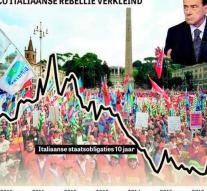
Investor more comfortable on Italy
amsterdam - The fourth economy of Europe would become uncontrollable by the elections on 4 March, leave the EU and discharge the euro. The new government is almost certainly moving to the right, while extremes on the left and right are trumpeting loudly. But worries on financial markets over Italy are declining drastically.
In Rome, Turin and Milan, street battles between left and right are practically the order of the day. Extremists and populists seek the confrontation. The brutal murder of Pamela Matropietro (18) by a failed asylum seeker recently fueled the street rage. The subsequent murder attempts on six Africans Luca Traini, an extremist with Nazi sympathies, increased the tensions.
Italy, with a government debt of € 2.23 trillion (132% of GDP), feels the pressure of thousands of boat migrants from North Africa. Italians surveyed think in a majority that 'Europe' leaves them at the reception.
In addition, more than one in ten Italians is unemployed, with strong concentrations in the south. The increase of the gross domestic product is 1.2% to the leanest in Europe.
With the fall of the Renzi government last year and an unstable political system, the economy is worrying investors. At the end of 2017, major investors called the Italian elections, with the French and German counterparts, brexit and Turkish riots, as the biggest political risk for investors. Their outcomes had the potential to drop the scholarships.
None of the political parties in Italy gets a majority according to the latest poll on 4 March. They're looking for bonds. Triple Prime Minister Berlusconi (81), who with Forza Italia vigorously promises illegal immigrants and wants to go to a single tax rate of 23%, gets more weight again.
Berlusconi cooperates with extreme right-wing parties that make the block promising for a coalition. Although he himself can never become prime minister because of a criminal record because of fraud. Tax reduction, better pensions and less compensation for migrants dominate in flyers' texts.
The block Berlusconi- Forza Italia, Lega (ex-Lega Nord) and the Brother Party- with 36.5% trumped the Five Star movement (27%) and the Democratic Party of Renzi (25%). Almost certainly there will be a less Europe-minded government.
For a workable government at least 40% of the votes would be needed.
According to political analysts, only Berlusconi can get a majority together, possibly with Renzi's party. Berlusconi also explicitly fights for the favor of small parties in the south, full of former Christian Democrats who were flexible in voting behavior.
Exchange traders and fund strategists see a relatively flat curve for the yield (see illustration), the effective return, on ten-year Italian government bonds, despite the heated confrontations on the street and television during talk shows. The Italian state can easily pay its debt at a limited premium to investors, such as pension funds.
Why is the market relatively quiet after failing with the Trump election and the Brexit referendum? Ralph Wessels, head of investment strategy at ABN Amro Mees Pierson: 'The risks of a very surprising election result have become more limited. In addition, the market has already incorporated the risks into the current bond rate. '
ABN Amro Mees Pierson even prefers Italian government paper in the government bond market in Europe. If the elections are not so bad, the interest rate will go down, and it will earn on this investment. 'We want to take this risk premium. 'Any shock after 4 March will lead briefly, but not to structurally higher longer rates, the private bank thinks.
Italy can also rely on the ECB. In the past years, it has been possible to put government bonds in the market longer thanks to the Frankfurt buy-out program. It reduced its interest obligations so cheaply. On average, the debt paper has now been in place for seven years, against four years shortly after joining the EU.
According to ECB director Peter Praet, with these long-term government bonds, the sensitivity to a possible interest rate shock for Italy after 4 March is not really that high. That large investors such as pension funds recently bought long-term Italian debt paper, he mentioned in early February.
'Italy will probably not leave the EU after March 4. The other fear that the euro will disappear after these Italian elections has largely disappeared among investors ', says strategist Simon Wiersma (ING Investment Office). 'It will then certainly be difficult to form an Italian government, but that uncertainty praises the bond market as small. '
Economist Aline Schuiling (ABN Amro Economic Bureau) sees a failed Italy. It has become unlikely for the elections to produce a stable government that is able to implement far-reaching policy changes smoothly.
Jeremy Lawson, economist with asset manager Aberdeen Standard Investments, calls the election as the 'first test of anti-EU sentiment this year'. He also estimates the chance that the result will lead to an 'Italexit' as 'extremely small'.
Kristina Hooper, strategist for the world markets with asset manager Invesco, looks further ahead. In any case, emerging populism will create more protectionism, trade barriers and rising prices. That does nourish the fear of rising inflation. And so a rising interest rate for investors, warns Hooper of Invesco.

Leave a comment